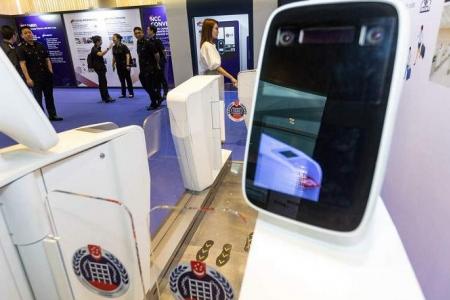Passport-free clearance to be rolled out at all Singapore checkpoints from 2024
Singapore residents and visitors leaving the Republic will be able to clear checkpoints without having to use their passports from 2024.
Instead, they can clear immigration via QR code at land checkpoints if travelling by car, or the new contactless Automated Border Control System (ABCS) at passenger halls.
During its workplan seminar at the Singapore Expo on Friday, the Immigration and Checkpoints Authority (ICA) said the manual counters at all passenger halls at checkpoints will be progressively replaced by about 800 automated lanes using ABCS from the first quarter of 2024.
The ABCS lanes will use biometrics for clearance, and are part of the ICA’s new clearance concept (NCC), which was announced in 2019.
The NCC transformation plan aims to provide faster and more secure immigration and Customs clearance. The system was trialled at Tuas Checkpoint and Changi Airport Terminal 4 in 2019.
For those travelling by car, ICA said it trialled the Automated Passenger In-Car Clearance System (Apics) in 2022, with about 94 per cent of travellers able to use the system without assistance from officers.
ICA will be working with the Home Team Science and Technology Agency to further improve Apics before rolling it out in phases at the land checkpoints.
The first phase, expected in early 2024, will introduce QR code scanning in lieu of passport scanning at land checkpoints.
Those travelling by car can create a profile and generate a QR code via the MyICA mobile app, allowing them to scan the code at the manual immigration counters, where ICA officers will conduct facial image checks on the travellers using the QR code data.
The same QR code can be used for future trips if the traveller’s passport details do not need to be updated.
From 2026, Apics lanes will be introduced at Tuas Checkpoint, allowing travellers to scan their generated QR codes and present their biometrics for identity verification, removing the need for officers to be stationed at every car lane.
Apics lanes are expected to be introduced at the redeveloped Woodlands Checkpoint from 2028.
The event on Friday also saw ICA celebrating its 20th anniversary. The authority was formed in 2003 from a merger of Singapore Immigration and Registration and the checkpoint operations of the Customs and Excise Department.
The seminar’s theme was “Remembering Our Past, Securing Our Future”.
Minister for Home Affairs and Law K. Shanmugam, guest of honour at the event, said the checkpoints are expected to get busier, with more challenges for the ICA.
“Terrorism threats remain very real, we never know when the next pandemic may strike, and there is a limit to how much manpower we can call on, given that Singapore has an ageing population,” he said.
“And really, the answer to all of these is further transformation.”
He is confident the ICA will be able to step up to tackle these challenges.
“ICA’s development over the years has been possible only because ICA has been, and remains, agile, clear-sighted, bold, and at its core, has officers who are continually being developed with the ultimate commitment to serve our citizens wholeheartedly,” he said.
“I think we all can be confident that ICA will continue to deliver on its mission as a world-class border and immigration agency, and I look forward – we all look forward – to the continued transformation.”
Other aspects of the NCC featured during the seminar on Friday included the Automated Clearance Initiative, which was implemented in May 2022.
ICA said more than four million foreign visitors from 51 jurisdictions have enrolled in the initiative and cleared immigration using automated lanes, with their biometric details.
During Budget 2023, the Ministry of Home Affairs said it will be spending more than $1 billion on development projects this year, including the ABCS.
Special assistance lanes, which were introduced at some passenger halls in Changi Airport last December and allow multiple travellers to perform immigration self-clearance as a group, will be extended to other checkpoints from end-2023.

For cargo, ICA said it cleared more than 9.7 million containers, consignments and parcels in 2022, with the volume expected to increase in the coming years.
To help officers better detect potential threats, ICA is trialling the use of artificial intelligence to track anomalies in the scanned images of cargo, parcels and baggage.
Another transformation plan featured at the seminar is ICA’s Services Centre Next Generation (SCNG), which aims to provide a “No Fuss; No Visit; No Waiting” experience.
As part of SCNG, all of ICA’s core application services, such as birth and death registration and passport renewal, are available online as at end-2022.
A new ICA Services Centre, which will be located next to the existing ICA Building in Kallang, is expected to begin operations in 2024 as a one-stop centre for all of ICA’s services.
The centre will also allow self-collection of identity cards and passports.
ICA said: “Over the past 20 years, ICA has continually adapted and innovated to be able to secure our borders even in the face of rising traveller and cargo volumes, and while facilitating these movements.
“ICA will press on with our journey to transform border clearance and immigration and registration services, to bring about a fundamental, positive change in how ICA interacts with the public at all our touchpoints.”
Get The New Paper on your phone with the free TNP app. Download from the Apple App Store or Google Play Store now


